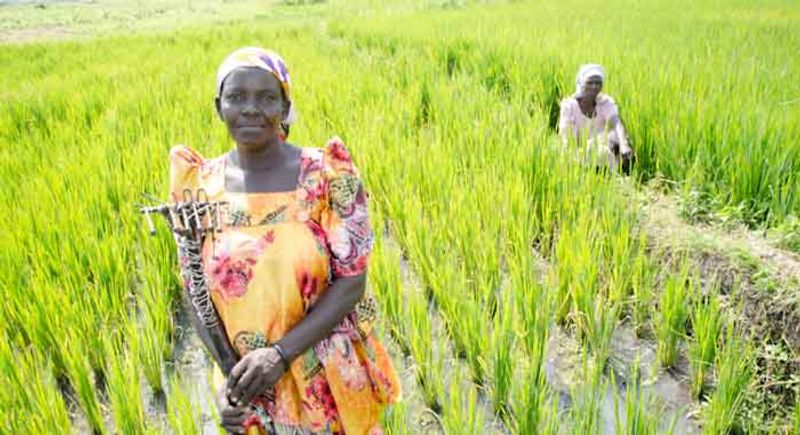

Rice farmers in Mazzimasa, Butalejja district eastern Uganda. Woman are the primary food producers in Uganda, even though their rights over land are not secured
Women play a pivotal role in Uganda’s food system. In most cases, they do more than half of the on-farm work while men are more active in marketing, agro-input purchases and agro-processing. The food system is a complex web of activities involving the production, processing, transport, and consumption.
A wide gap separates the woman farmer in Uganda from the basic information and resources she needs to increase agricultural productivity, efficiency, and income. On the other hand, it is much easier for men to have access to productive resources such as land, credit and extension services.
The inequalities in our food system have been created by a combination of male control of land, culture and government policies which directly or indirectly hinder gender mainstreaming.
Nationwide, 90% of all rural women work in agriculture, and they produce an estimated 80% of food output.
Even though women contribute such a substantial amount to Uganda’s agriculture, they’re not the majority landowners.
A study by the UN Food and Agricultural Organization (FAO), estimates that only 14% of women are sole owners of agriculture land in Uganda. This makes men have a strong influence on how land should be utilized because they ‘own’ it!
Women need land but cultural and government policies dating back to pre-independence have deeply influenced who owns it. In some cases, women may be the legal owners of land but they may not have access to it or may not be able to make decisions related to its utilization because of male-controlled culture, norms and lack of empowerment.
It is important to note that lack of land ownership rights limits women’s access to agricultural credit as a result of inadequate or no collateral.
Recently, the High Court family division outlawed the practice of men dispossessing their wives of matrimonial property by bestowing it to their sons in their Wills without the spouse’s authorization. Justice Godfrey Namundi ruled, “A cultural practice where the heir inherits matrimonial home denying [the] widow’s proprietary rights is discriminatory in nature”
As an advocate for gender equity in food systems, I found his ruling energizing because it sets a good legal precedence for women’s rights to land, particularly widows.
Creating and implementing gender-sensitive legal environment will facilitate more women to own land which is important for their economic empowerment in agriculture.
Men naturally are more interested in money to keep up with family needs which makes them more interested in growing cash crops. On the other hand, women are naturally family caretakers. That’s why they are good at planning for family diets. It should be noted that women are most likely to be victims of gender-based violence if there is food scarcity in a home.
According to Uganda Bureau of Statistics (UBOS) National Panel Survey, male-managed plots were 60% larger and 11 percentage points (25% versus 14%) more likely to be planted with cash crops such as bananas and coffee.
I am not against the cultivation of cash crops. However, there’s need to strike a balance between high-value commodity cash crops and food crops. That way, we shall have healthy food systems and a strong agrarian economy.
The writer is a graduate student of Food safety and security at Tel Aviv University, Israel














Owen Singura
Leave a Comment
Your email address will not be published.